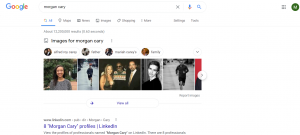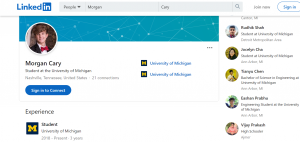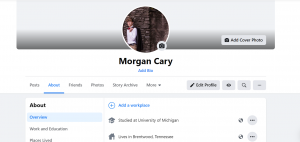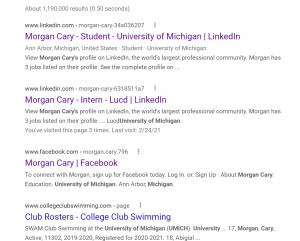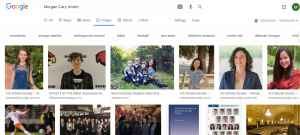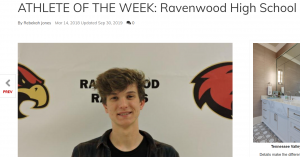Morgan Cary
Contents
Introduction
I had always considered myself to be “chronically” online, especially during my early teenage years, so I was somewhat concerned about the things that could turn up while researching myself. I was all over the internet, and had accounts registered with all sorts of different sites, and using the same pseudonyms, passwords, and general login info for each of them. Before beginning my research, I was almost certain that despite my attempts at regaining internet anonymity in the past, I would be forced to face, and report on one form or another of cringe-inducing media broadcast by 13-year-old self on Instagram, or Google+ during the early 2010s.
However, I soon came to find that my digital footprint was entirely different than what I had expected it to be. Through this wiki, I will demonstrate how most information relating to myself that is available through search engines is information that I had essentially “hand-selected” to be there, and nothing aside from that (save several pieces of information that were out of my control) could be found about me online (at least, at the civilian level). This serves to work in my favor, as we will see later on, as it demonstrates that while my online identity is searchable, verifiable, and genuine, it also serves as a platform for conveying the “best aspects” of my identity (or at least, the most desirable aspects from an employer’s standpoint) to those actively searching for me.
Round 1: Googling Myself
According to preliminary google results, I am not yet immensely popular. None of the photos on google images are of me, although my current LinkedIn profile is prominently displayed as one of the first available links for a researcher to click on when searching for me.
This is desirable, as my LinkedIn account displays me in a positive light. Here, parties interested in Morgan Cary can learn where I am currently attending University, along with my work and volunteer experience, as well as the accolades that I have earned. Furthermore, my LinkedIn account provides direct access to some people that I know, and have worked with (such as previous employers, family members, friends, etc.) while also displaying me alongside other impressive looking students’ profiles.
Other than that, googling my name provides little more information than access to an outdates Facebook account that I made in the summer of 2018. I have only used it a handful of times, once to join a U of M Facebook group in order to receive rush updates (which I later left), and once to join the “southern Michigan hedgehog owners” group from when I was trying to find more in-depth information about my new pet. Seeing as it has seen such rare use, the Facebook page provides little insightful information into my digital life, aside from what can already be easily obtained elsewhere.
Is That It...?
I was surprise that so little about me was available online. After all, I have vivid memories of wasting hours at a time on the internet, throughout my life, and posting quite a bit. It’s hard to imagine that all of that is really gone. However, after much time spent searching for myself online, it turns out that there just is not much available online about this particular Morgan Cary (yet). Even searching my full name (Morgan Christopher Cary) did not yield any important information about me. However, I soon remembered that I could combine information I had found about myself with my name to yield more accurate search results. After attempting that, I was relieved to find more information about myself available.
Round 2: Focusing the Search
After searching for my name, along side terms like: “U of M”, “Umich”, and “University of Michigan” search results for "Morgan Cary" became incredibly honed, and provided some new information as well. Additionally, when searching a term like “Morgan Cary Umich”, a photo of me will be displayed on google images.
Extracurricular Info
This photo is from an article written in 2018, when I received the “Athlete of the Week” award in high school, while the captain of the swim team. It contains a generally glowing review of both my academic and athletic career, before mentioning that I am going to be attending the University of Michigan. While providing no new information compared to what was already available online, this page serves as a means of backing the validity of claims that I make in documents such as my resume, LinkedIn, and in general. As does the registry of my activity in the University of Michigan Club Swim Team, which is also displayed when searching my name alongside the school’s.
Otherwise, no information can be found out about me on the internet using cursory search methods. Even after using the WayBack Machine (a database that logs and provides access to webpages from the past that may have been deleted) I was not able to find any reportable information regarding my Online Identity.
Bonus Round: DuckDuckGo
I decided to attempt one last search, using the engine “DuckDuckGo” (which is allegedly a much better, less “corrupt” search engine than Google). This actually yielded an interesting piece of information about me.
When searching “Morgan Cary” on DuckDuckGo, one is immediately met with the White Pages, a site used for identifying tenant information. Most people’s information is on it, in one way or another. That being said, while my name is not immediately available upon first glance, the name, and subsequent information of my father is. In addition to my home address, phone number, and other slightly personal information, the names of my entire family are made available through this site.
While these results are slightly unsettling, I am unsurprised that they are at least somewhat accessible, as the information being presented is all publicly available. That being said, I was taken aback by the wealth of easily accessible information available about my family (and by extension, myself) that can be dug up by absolutely anyone with a computer. This is further exasperated by the fact that White Pages collects their data from property records, telecom companies, etc. which feels like an invasion of privacy. Upon doing further research, I found that individuals can request to edit (or entirely delete) their White Page entry, which I intend on doing. While I think that this is a good thing, I do not support the White Page's unyielding publications of individuals semi-private information on a site that many either have no knowledge of, have difficulty accessing, or both.
Conclusion
As previously stated, I had once attempted to regain my online anonymity, but had not expected that my efforts had been so thorough. There is little trace of any data relating to my personal identity online available, and the data that many search engines do in fact turn up has been selected by me to show up.
It was interesting to find that the data available about my Digital Footprint amounts to little more than my self-promotional LinkedIn page, a dead Facebook account, and some links relating to my swimming past-time. Aside from basic identifying information, and my accomplishments, there is little else available about me that can be found online.
Of course, this does not make me invincible. I know that using the internet is more or less a responsibility granted to us, and that while maintaining my privacy is important, it is equally important to have a presence, and my research has provided shockingly little evidence of my existence outside of my Professional Identity.
While my Digital Self is verifiable, genuine, and easily searchable, I can see how one may view it as somewhat superficial, due to a general lack other identifiable information relating to me available online. I hope to work to fix this, and plan to hopefully boost my online presence in a way that is healthy, productive, and meaningful. I hope to continue building an accurate representation of myself, while also maintaining touch with reality in order to provide the most accurate representation of myself that I can, in order to avoid the pitfalls that many come across when navigating the internet.
I am all too aware of the threats that can befall people, the phishing, scamming, and general fraud that can occur, aided using fake online identities. I hope that through my efforts, I will be able to secure mine.
